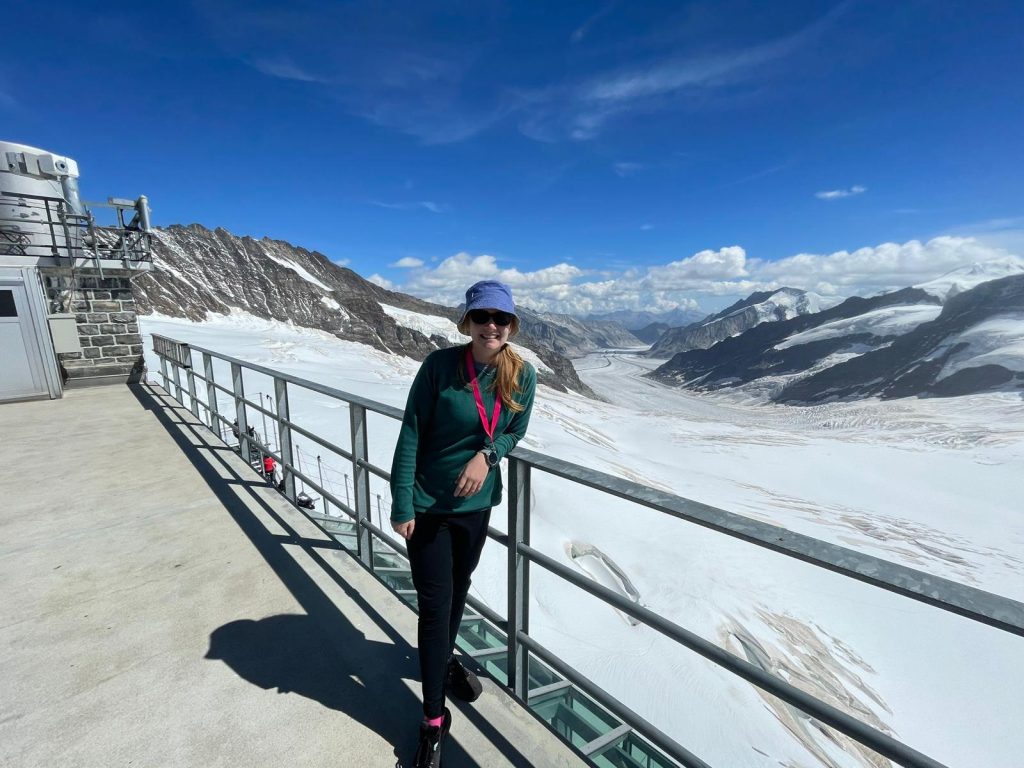Bridging Climate Realities: From South Africa to Switzerland

Image: Lizé Myburgh
During the summer holidays, students from all over the world come to Bern to attend the university’s international summer schools. Lizé Myburgh is one of them. She gives us an insight into her experience at the Summer School on Climate Change and talks about the most precarious climate change issues facing her Rainbow Nation.
I catch Lizé on a Zoom call just a few hours before she leaves. She is soon heading to the rural Northern Cape region where she will be quite unreachable – doing fieldwork on a predator-friendly, regenerative livestock farm. “I will stay on this farm for about six weeks and every second week I will be camping in a tent and herding the sheep.” It is a project for Lize’s master’s thesis as she is now finishing her Sociology studies at Stellenbosch University.
Last time we met was in mid-August at the Climate Change Research Summer School organized by the University of Bern. Today, Lizé is reflecting on that experience from her home in South Africa, a country that in recent years was dramatically affected by the climate crisis.
Motivated by the precarious situation
Five years ago, South Africa was making headlines globally. Its legislative capital of Cape Town almost reached so-called “Day Zero” and nearly ran out of fresh water because of decreasing rain due to climate change. According to Lizé, it’s not only the big cities that are affected by water shortages: “Most of the area that I am looking at in my research has been very delicate for a long time. The settlements there have to drill boreholes to access water. Furthermore, the dryness also impacts an already marginal ecology.”
Lizé herself grew up in the Northern Cape province in the remote town of Prieska. “It is mostly known as a commercial farming region for grain and livestock – imagine big farms and tractors.” She adds that for some time now both the Northern and Eastern Cape have had concurrent droughts that worsened with El Niño. “It is clear that many people’s livelihoods here will be undermined in the long term. That is why my research is looking at how one adapts, how to become more sustainable, and how we can live with nature rather than seeing it only as a raw material.” By joining the Summer School in Bern, Lizé hoped to learn more about the effects of climate change and practical solutions.

Learning by doing
During the Summer School, scholars in economics, law, social, and natural sciences gave lectures and organized workshops on the topics of the physical climate system, climate economics, and governance. Lizé appreciates the diverse perspectives given by this interdisciplinary approach: “It was a completely new experience for me. I loved learning about climate modelling, for example. The math of it is fascinating and understanding it is an important skill that I acquired.”
Students were also asked to directly apply the new knowledge in group projects and a simulated negotiation. “We all represented a particular country or stakeholder, which meant we had to understand their stance and policies on carbon emission reduction very thoroughly.” She points out that such exercises gave her a glimpse into difficult realities when it comes to global negotiations about climate policies.
Cooperation and people are key
Lizé also mentions the atmosphere: “It differed quite a lot from regular studies because you meet people from various places who are very motivated to learn and engage. We learned so much about each other’s political systems and our countries’ climate issues. That was an invaluable experience for me.” Since the climate crisis is a global issue, Lizé strongly believes that there should be even more cooperation and learning from other experiences and approaches. It is an intriguing suggestion.
What can Switzerland learn from South Africa? “Often the decision-makers in the Global North forget that climate change effects are the most perilous in the Global South. There needs to be a recognition of how the reality in Switzerland does not reflect places like South Africa.” Lizé thinks that South Africa’s colonial history as well as its pronounced inequality and racial tensions have taught the country that there must be a more emphatic way of approaching problems: “We are trying to understand who is going to lose jobs and who is going to be hurt the most from climate poverty and inequality. Maybe we could share these insights with you?”
Lizé ends the conversation with an open invitation to the Bernese students to visit South Africa and to keep looking for solutions together.
Text: Jurga Kveksaite
Images: Lizé Myburgh